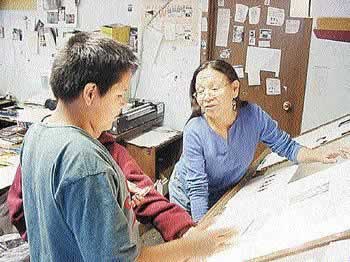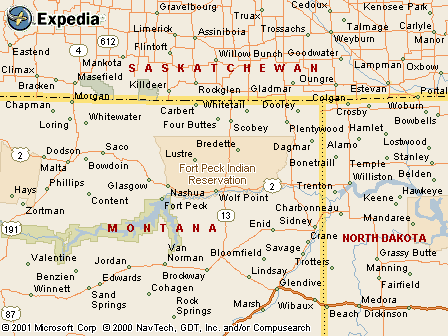|
|
Canku Ota |
|
|
(Many Paths) |
||
|
An Online Newsletter Celebrating Native America |
||
|
October 19, 2002 - Issue 72 |
||
|
|
||
|
Fort Peck Tribe Honors Newspaper Editor |
||
|
by Carol Bradley Great
Falls Tribune
|
||
|
credits:Rich Peterson
photo
Wotanin Wowapi Editor Bonnie Red Elk shows some Poplar fifth-graders the layout table at the newspaper. News staffers still lay out the paper by hand, with the help of scissors, knives and wax. Red elk has made the weekly a respected tribal institution. |
|
"You're printing negative news," they protested. "What's going on?" The newspaper faced a no-win situation common to many tribal newspapers: It was trying to cover the very entity that controlled its purse strings. "I would just tell them calmly and without getting anyone upset, 'We're just printing what we see,' " Red Elk, who's now the editor, said of those early days. "We'd go to the committee meetings, and they weren't used to that." Today, even tribal council members couldn't imagine life without the Wotanin. They're helping Fort Peck Community College throw a big dinner tonight in honor of the weekly newspaper and the woman behind its success, Red Elk. The idea for the dinner jelled several months ago when Caleb Shields, a former tribal chairman who's now the council's chief of staff, and former state Rep. Bill Whitehead got to talking about the Wotanin, Shields said. "We realized that, geez, they've gotten all these awards but never one from their own people, their own tribe," Shields said. Founded in 1970 by a Vista worker, the Wotani, as readers call it, is the oldest Indian weekly newspaper in North America and a perennial prize-winner in Native American Journalists Association contests. It has won first place for coverage of tribal government the last two years. It won first place for a native weekly newspaper in 1994 and picked up honorable mentions in the same category in 1993, 1995 and 1997. The Wotanin has come a long way from the days when mimeographed copies featured stories about council matters interspersed with historical tidbits. Translated, Wotanin Wowapi means simply "Something to read." On good weeks, the Wotanin now runs 24 broadsheet pages. Its yearly budget has grown to $230,000, and only a fraction of that amount -- $44,000 -- comes from the tribal council. Red Elk's goal is to make the newspaper completely self-supporting, stable enough financially that "we don't have to accept a dime from the council." She started working at the newspaper in 1975 under Terry Boyd, a tribal member who succeeded two Vista workers. When Boyd took a leave the following year, Red Elk was tapped for the editor's job. She's held it ever since. Under her leadership, the newspaper has broadened its coverage to include DUIs and other court news, child abuse cases, homicides and alcohol-related deaths -- the kind of information readers used to have to glean from the grapevine. The Wotanin also reports which tribal officials are traveling where and who's picking up the tab. Along the way, Red Elk has developed something every good journalist needs: skin thick enough to deflect the barbs. "I've seen people scream at her," said Richard Peterson, a tribal member and former Tribune reporter who has worked off and on at the Wotanin. "She'll sit there and listen. She doesn't get mad." 'People's newspaper' "But (Red Elk) firmly believes it's the people's newspaper, and they have a right to know what the council's doing," he said. "She's stood by that for the 15 years I've known her." It hasn't always been easy. Early on, the tribal council named a censoring board to screen the Wotanin's stories. The council backed down after the newspaper wrote about the panel and readers complained, Red Elk said. Despite the occasional complaint, she credits present-day tribal councils with giving the Wotanin free rein. "We have freedom of the press where it concerns the council," she said. "I know that's not a problem in the non-Indian world, but a lot of tribes, they don't allow full access to the information." Happy ads Happy ads usually fill the entire back page of the newspaper; at Christmas time they take up six to eight pages. They're one of the Wotanin's best-liked features. The newspaper is so popular, in fact, that by the time copies arrive hot off the presses around noon each Thursday, people are waiting in the Wotanin's office in downtown Poplar to buy a copy. Senior citizens may pick up a paper for free. Everyone else pays 35 cents. Red Elk does 'a lot' "She does a lot. A lot of everything," Duboise marveled. "When budget time comes, she does the budget. She goes to all the council meetings." Red Elk said she still covers the council meetings because "nobody else will touch it." She and her staff of three full-timers -- Duboise; typesetter/circulation manager Verdis Greybull and advertising representative Marian Montclair -- work normal hours Monday and Tuesday. The newspaper also employs one part-timer and anywhere from four to six freelance writers. Wednesday is crunch day: The staff rolls in around 9 a.m. and stays until 11 p.m., midnight or all night if necessary -- however long it takes to put the paper together. Thursday press day Among the 150 or so guests attending tonight's dinner will be her husband, Herman, and their four children: 20-year-old Clifford; 15-year-old Charley; 14-year-old Vern; and Randy, 10. Red Elk, 50, attended Haskell Indian Junior College in Kansas for a year and half and earned a bachelor's degree at the Native American Educational Service on the reservation. But her real education has come from her job at the Wotanin, she said. "At one point I was the only reporter, so I got to go to everything, whether it be a meeting, some fun event," she said. "I got to see the council in action through many chairpersons." She's modest, too When the dinner was first announced, Red Elk "wanted it kept quiet," Shields said. "I said, 'You gotta do it. It's not just for you.' " A self-described private person, Red Elk is just hoping she won't have to stand up and give a speech at the close of the festivities. "I told them, 'If I have to say something, I'll just write it in the editorial pages,' " she protested feebly.
|
|
|
||
|
|
||
| Canku Ota is a free Newsletter celebrating Native America, its traditions and accomplishments . We do not provide subscriber or visitor names to anyone. Some articles presented in Canku Ota may contain copyright material. We have received appropriate permissions for republishing any articles. Material appearing here is distributed without profit or monetary gain to those who have expressed an interest. This is in accordance with Title 17 U.S.C. section 107. | ||
|
Canku Ota is a copyright © 2000, 2001, 2002 of Vicki Lockard and Paul Barry. |
||
 |
 |
|
|
The "Canku Ota - A Newsletter Celebrating Native America" web site and its design is the |
||
|
Copyright © 1999, 2000, 2001, 2002 of Paul C. Barry. |
||
|
All Rights Reserved. |
||
 FORT
PECK, MT - The first few times Bonnie Red Elk wrote about Fort Peck
tribal council doings for the Wotanin Wowapi in the early 1970s, council
members summoned her for a scolding.
FORT
PECK, MT - The first few times Bonnie Red Elk wrote about Fort Peck
tribal council doings for the Wotanin Wowapi in the early 1970s, council
members summoned her for a scolding. 